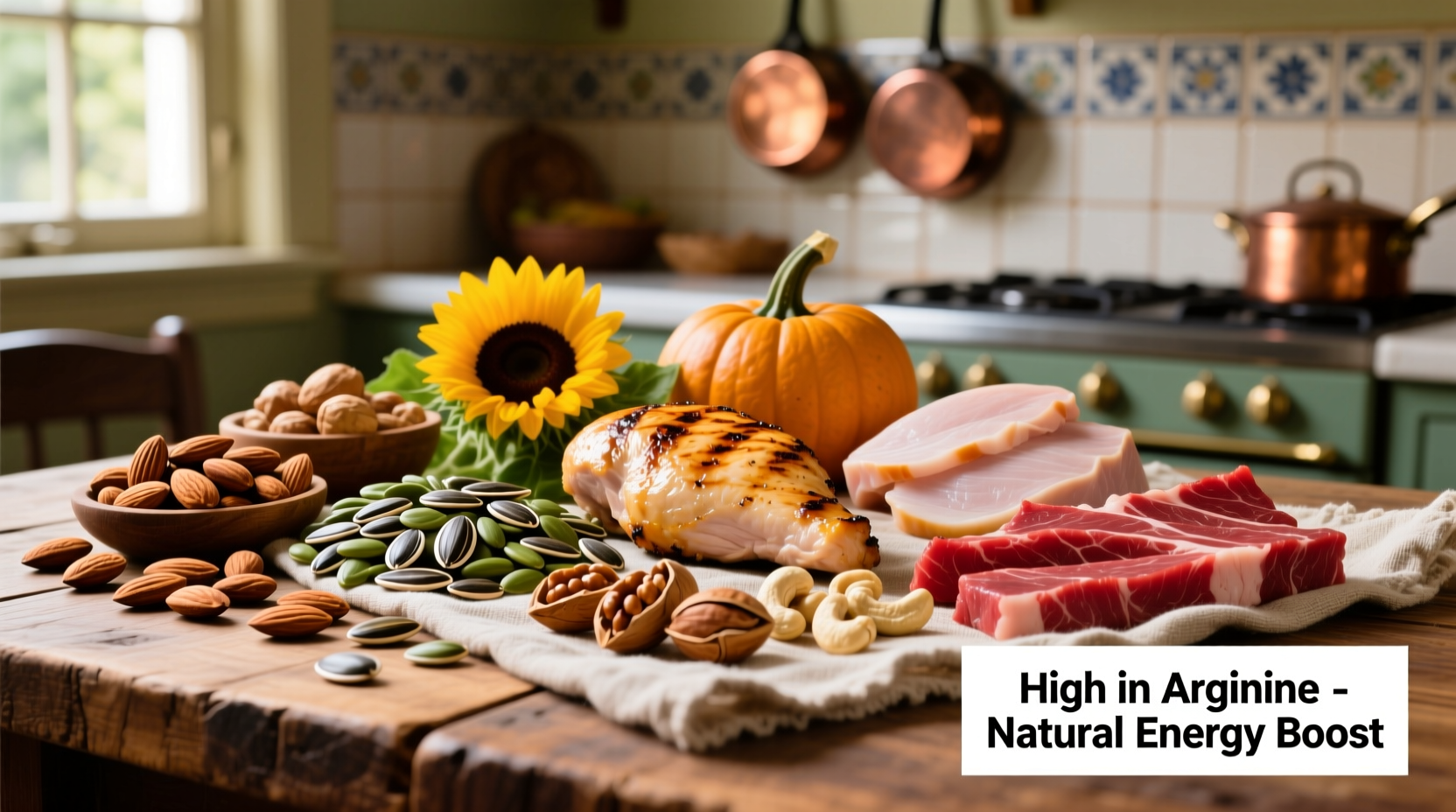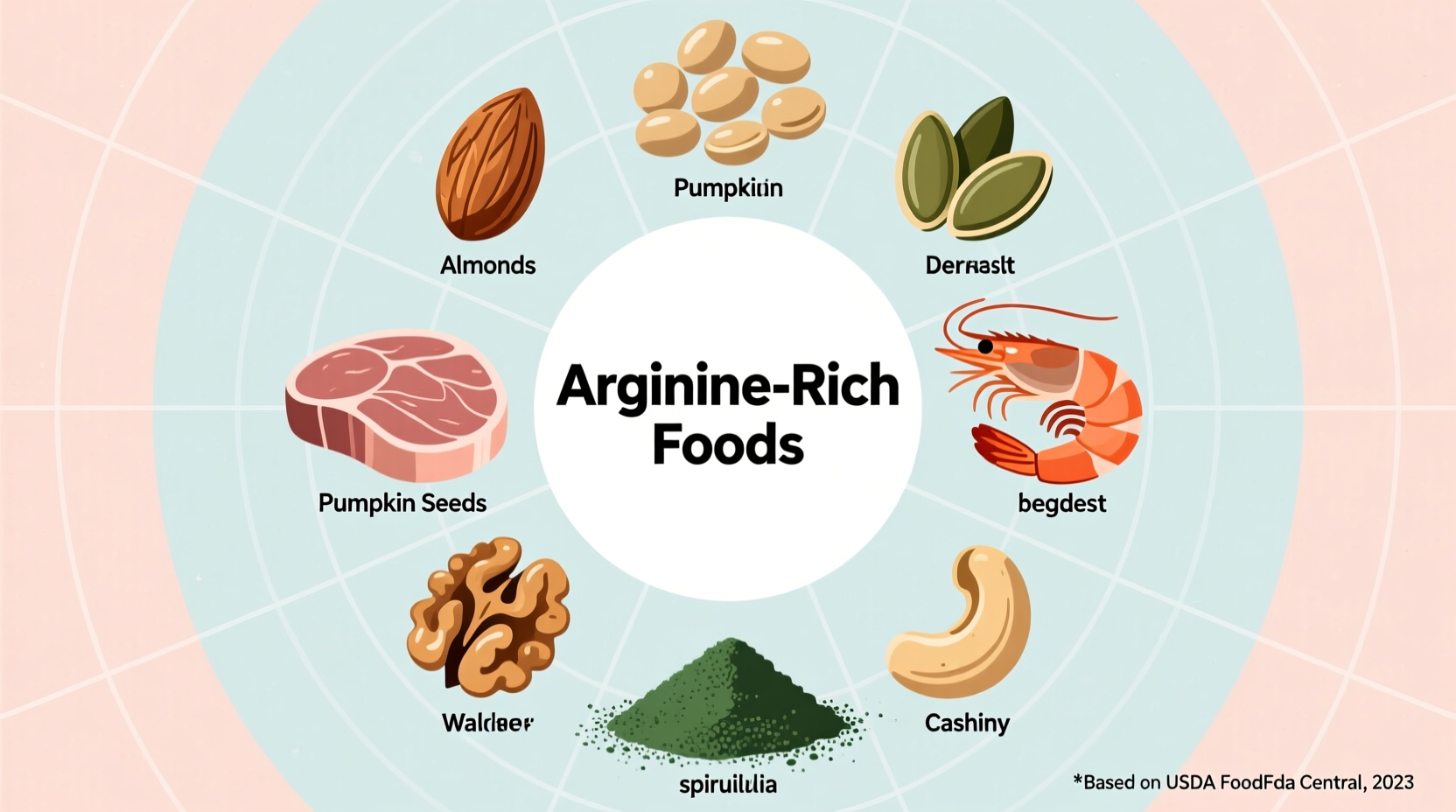Discover the most potent dietary sources of arginine, an essential amino acid crucial for cardiovascular health, immune function, and protein synthesis. This comprehensive guide delivers science-backed food listings with precise arginine measurements per standard serving, helping you optimize your nutrition with evidence-based choices.
Why Arginine Matters for Your Health
Arginine serves as a precursor to nitric oxide, which regulates blood vessel dilation and supports healthy circulation. According to the National Institutes of Health, this amino acid plays vital roles in wound healing, hormone secretion, and ammonia detoxification. While your body produces arginine naturally, dietary sources become essential during periods of growth, stress, or specific health conditions.
Top Animal-Based Arginine Sources
Animal proteins generally provide higher arginine concentrations per serving. These complete protein sources deliver all essential amino acids alongside arginine:
| Food (3 oz serving) | Arginine (grams) | Protein Content |
|---|---|---|
| Turkey breast | 16.0 | 28g |
| Chicken breast | 3.9 | 26g |
| Pork loin | 3.4 | 22g |
| Salmon | 2.3 | 22g |
| Eggs (2 large) | 1.0 | 12g |
Data sourced from USDA FoodData Central shows turkey breast contains exceptionally high arginine levels. This nutrient density makes poultry particularly valuable for athletes and active individuals seeking natural performance support.
Best Plant-Based Arginine Options
Plant sources provide excellent arginine alternatives for vegetarians and vegans. While most plant proteins are incomplete, combining various sources ensures comprehensive amino acid coverage:
| Food (1 oz or standard serving) | Arginine (grams) | Fiber Content |
|---|---|---|
| Pumpkin seeds | 7.0 | 5g |
| Soybeans (cooked) | 4.6 | 10g |
| Peanuts | 3.8 | 2.4g |
| Chickpeas (1 cup) | 1.3 | 12.5g |
| Almonds | 1.2 | 3.5g |
Research published in the American Journal of Clinical Nutrition confirms that plant-based arginine sources often come packaged with additional heart-healthy nutrients like fiber and unsaturated fats. Pumpkin seeds emerge as a nutritional powerhouse, delivering seven times more arginine per ounce than most nuts.

Daily Arginine Requirements Explained
The National Academy of Medicine hasn't established a formal daily value for arginine, but studies suggest adults need approximately 2-3 grams daily from dietary sources. Individual requirements vary based on:
- Physical activity level: Athletes may require up to 30% more arginine
- Health conditions: Cardiovascular patients often benefit from increased intake
- Age: Older adults may need higher amounts due to reduced synthesis efficiency
A single serving of turkey breast provides more than five times the baseline daily requirement, making strategic food selection essential for balanced intake.
Practical Incorporation Strategies
Maximize your arginine intake with these chef-tested techniques that preserve nutrient integrity:
Smart Cooking Methods
High-heat cooking can degrade amino acids. Opt for gentle preparation methods:
- Steam soybeans instead of boiling to preserve amino acid structure
- Lightly toast nuts and seeds at 300°F (150°C) for enhanced flavor without nutrient loss
- Marinate poultry in acidic ingredients like lemon juice before cooking to improve amino acid availability
Daily Meal Integration
Simple dietary adjustments can significantly boost your arginine levels:
- Start your day with a pumpkin seed smoothie booster (1 oz seeds = 7g arginine)
- Replace croutons with roasted chickpeas in salads
- Use turkey breast as a protein base for lunch instead of processed deli meats
- Snack on a small handful of almonds (1.2g arginine) between meals
Important Considerations and Limitations
While arginine offers numerous health benefits, certain populations should exercise caution:
| Population | Recommendation | Scientific Basis |
|---|---|---|
| Herpes simplex carriers | Moderate intake; balance with lysine-rich foods | NIH study shows arginine may trigger outbreaks |
| Post-heart attack patients | Avoid high-dose supplementation | JAMA research indicates potential risks |
| Healthy adults | Food sources preferred over supplements | Natural food matrix enhances absorption and safety |
Always consult with a healthcare provider before making significant dietary changes, especially if managing chronic health conditions. Food-based arginine intake generally presents minimal risk compared to concentrated supplements.
Maximizing Your Arginine Nutrition
Understanding which foods contain arginine empowers you to make informed dietary choices that support cardiovascular health and overall wellness. By incorporating a variety of the protein sources listed in this guide, you can naturally meet your daily requirements while enjoying delicious, nutrient-dense meals. Remember that balance remains key—combining arginine-rich foods with other essential nutrients creates the most effective nutritional strategy for long-term health.











 浙公网安备
33010002000092号
浙公网安备
33010002000092号 浙B2-20120091-4
浙B2-20120091-4